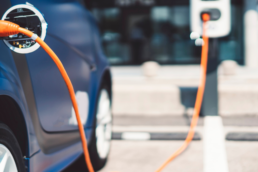Position paper on CO2
Standards for cars and vans
The Platform for Electromobility supports the overall greenhouse gas emissions reduction target of 55% by 2030 and the climate neutrality objective by 2050. Reducing – and ultimately eliminating – emissions from cars, vans and trucks will be key to achieving these objectives.
The Platform for Electromobility would like to emphasise that the EU CO2 standards regulation delivers genuine benefits for transport, setting clear signals to both car makers and consumers on the required pace for the transition to zero-emission mobility. This regulation is the most effective way to do so, when compared to the extension of the ETS system to road transport.
The future cars and vans CO2 legislation will increase the offer and promote the market uptake of zero-emission vehicles. With an increased market, zero-emissions vehicles will also become more affordable with a continuously reduced total cost of ownership and more choice for consumers and will also help tackle air quality and noise issues, bringing an overall benefit to society.

For Europe to become carbon neutral by 2050, road transport needs to be entirely decarbonised by this date. Considering the average retirement age of petrol and diesel vehicles in Europe (around 15 years), the Platform for Electromobility believes that an EU-wide phase-out date for sales of new pure internal combustion engine passenger cars and vans no later than 2035 is necessary to achieve this objective with a clear emissions reductions trajectory. After 2035 looking at the overall life cycle carbon footprint of vehicles could be a relevant factor to consider.
Setting binding annual CO2 targets would be optimal from a climate perspective and would ensure a continuous CO2 emissions reduction trajectory. Such targets should follow a long-term emission reduction trajectory to ensure sufficient visibility for industry (ensuring annual targets are set sufficiently in advance, and minimum of 5 years). The current design of the car and vans CO2 regulation targets – whereby targets kick-in in five years intervals with no emission reductions required in between – is suboptimal from a climate perspective and means CO2 emissions actually increase in between, as was seen between 2016 and 2019 from new car sales.
The revised regulation should set significantly higher targets for CO2 emissions from 2030 and adding a binding interim target in 2027 of at least 37,5% CO2 emissions reduction (a date consistent with the technology reset required by the Euro 7 emission standard) to secure a more linear CO2 emission target trajectory and ensure new vehicles can fairly contribute to the higher overall GHG reduction target for 2030.
In addition to the CO2 targets, a mechanism incentivising zero-and low-emissions vehicles (ZLEV) should be maintained in the period up to 2030. Only zero-emissions vehicles should be eligible for the incentive system, as well as vehicles with emissions below a threshold lower than 40 g CO2/km. Ultimately, the ZLEV benchmark/mandate level should be adapted from 2030 onwards, and only zero-emission vehicles should be eligible for any incentive system. The Platform for Electromobility considers that another incentive type could be envisaged – based on an accurate impact assessment and analysis – in the form of a bonus-malus for the period up to 2030 with a realistic threshold. After 2030, the bonus would be removed to be replaced by a unique malus.

In addition, regarding specificities of vans (professional purposes, goods & persons transport) it should be considered to differentiate between the target levels for cars and vans until 2035.
The Platform is opposed to any mechanism that would consider the contribution of renewable and low carbon fuels in the compliance assessment for each manufacturer. Policies focused on decarbonising fuels and those focused on reducing emissions from cars and vans must remain in separate legal instruments.
We would like to underline that new skills and qualifications for workers in the automotive value chain will be needed. Excess emission premiums, which are paid by OEMs whose average specific emissions of CO2 exceeded their specific targets and whose amounts are considered as a revenue for the general budget of the EU, should be allocated to a new or existing fund or relevant programme with the objective of ensuring a just transition towards a climate-neutral economy, in particular to support re-skilling, up-skilling and other skills training and reallocation of workers in the automotive sector and ecosystem.
Data collected from fuel consumption meters (FCMs) – fitted as standard on all new cars from 2021 onwards – should be used for consumer information and vehicle labelling purposes, either via a review of the car labelling directive, or via direct amendments to the cars CO2 regulation, and from 2025 onwards be used for compliance with CO2 targets.
The Platform supports removing the target mass adjustment mechanism. Removing the target mass-adjustment mechanism has many benefits: it removes a structural weakening of the regulation; ensures that all carmakers have the same target therefore pushing the larger and more polluting segments to electrify more rapidly, in line with their heavier climate impact; and it simplifies the regulation.

The decarbonisation of the transport sector needs a holistic approach. The planned revision of the Alternative Fuels Infrastructure Directive (AFID) needs to support the harmonised roll-out of a high-quality charging infrastructure for BEVs. It should be turned into a regulation for road transport infrastructure and set minimum mandatory targets per Member States for the deployment of publicly accessible charging points with a minimum quality service requirement that are accessible for every consumer.
The Platform for Electromobility urges the Commission to seize the unique opportunity of the Fit for 55 package and of the Green Recovery Fund to achieve the EU Green Deal’s goal to fully decarbonise road transport by 2050 and make electromobility a lifelong reality.
